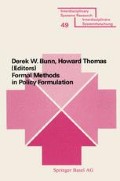Abstract
A probabilistic decomposition of the diagnosis problem is used to derive an optimal decision model in the medical context.
Access this chapter
Tax calculation will be finalised at checkout
Purchases are for personal use only
Preview
Unable to display preview. Download preview PDF.
References
F. Bégon, R. Trémoliéres (1). Elaboration d’un modèle logique du diagnostic, Bulletin de l’IRIA, No. 9, October 1971.
F. Bégon, R. Trémoliéres, C. Sultan (1). Presentation et illustration d’un modele du diagnostic â propos d’un exemple hématologique, Journees d’Informatique médicale, TRIA, 78 - Rocquencourt, France, 1972.
F. Bégon, R. Trémoliéres, M. Gouault, C. Sultan ( 1 ). Pratique du Diagnostic Logique, Hambourg Congress, 1972.
M. Mattei, J. Faure, M. Yacoub (1). Aide de l’informatique au diagnostic médical. Application en toxicologie clinique d’urgence, Rev. Inf. Med. Vol. 2, No. 2, June 1971.
Bibliography
N.E. Betaque, G.A. Gorry (1). Automating Judgemental Decision Making for a Serious Medical Problem, Management Science, Vol. 17, No. 8, April 1971.
A. Bouckaert (1). Reflexions sur le diagnostic médical. Les campagnes de dépistage, Rev. Informatique Med., 2(3), 243–251, 1971.
J. Donio, J. Minery, M. Tenenhaus, J. Ulmo (1). Le problème Bayesian. Appli- cation des modèles bayesiens sequentials au problème de l’aide a l’ action médicale, SEMA, Rapport de Recherche No. 28, Janvier 1970.
A.S. Ginsberg, F.L. Offensend (1). An Application of Decision Theory to a Medical Diagnosis-Treatment Problem, IEEE Trans. on Systems Science and Cybernetics, Vol. SSC-4, No. 3, September 1968.
L.B. Lusted, (1). Introduction to Medical Decision Making, Charles C. Thomas, Publisher, Springfield, Illinois, U.S.A. (1968).
A.A. Popov, V.A. Shul’ga, V.M. Yanenko, A.D. Krislov (1). Automation of the medical diagnostic process, IFIP Congress 71, August 1971.
D.H. Stimson (1). Utility Measurement in Public Health Decision Making, Management Science, Vol. 16, No. 2, October 1969.
R. Trémoliéres (1). Les méthodes d’exploration pour les programmes en nombres entiers, European Institute for Advanced Studies in Management, W.P. 72–10, March 1972.
R. Trémolières (2). Une théorie logique de la décision en horizon fini, Con- gress on Praxeologie, Prague, April 1972.
Editor information
Editors and Affiliations
Rights and permissions
Copyright information
© 1978 Springer Basel AG
About this chapter
Cite this chapter
Tremolieres, R. (1978). Automating Decision Making for the Diagnosis Problem. In: Bunn, D.W., Thomas, H. (eds) Formal Methods in Policy Formulation. Interdisciplinary Systems Research / Interdisziplinäre Systemforschung. Birkhäuser, Basel. https://doi.org/10.1007/978-3-0348-5288-3_9
Download citation
DOI: https://doi.org/10.1007/978-3-0348-5288-3_9
Publisher Name: Birkhäuser, Basel
Print ISBN: 978-3-7643-0971-8
Online ISBN: 978-3-0348-5288-3
eBook Packages: Springer Book Archive

